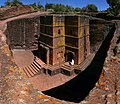This article includes a list of general references, but it lacks sufficient corresponding inline citations .(February 2019) |
| Around the World in 80 Treasures | |
|---|---|
 | |
| Genre |
|
| No. of episodes | 10 |
| Production | |
| Producer | BBC |
| Original release | |
| Network | BBC Two |
| Release | 21 February – 18 April 2005 [1] |
Around the World in 80 Treasures is a 10-episode art and travel documentary series by the BBC, presented by Dan Cruickshank, and originally aired in February, March, and April 2005. The title is a reference to Around the World in Eighty Days , the classic adventure novel by Jules Verne.
Contents
- Episode 1: Peru to Brazil
- Episode 2: Mexico to Central North America
- Episode 3: Australia to Cambodia
- Episode 4: Japan to China
- Episode 5: India to Sri Lanka
- Episode 6: Uzbekistan to Syria
- Episode 7: Jordan to Ethiopia
- Episode 8: Mali to Egypt
- Episode 9: Turkey to Germany
- Episode 10: Bosnia to France and Home
- Companion book
- See also
- References
- External links
In this series, Cruickshank takes a five-month world tour visiting his choices of the eighty greatest man-made treasures, including buildings and artifacts. His tour takes him through 34 countries and 6 of the 7 continents (he does not visit Antarctica). He did not visit Iraq due to the dangerous state of the country at the time.
In addition to seeing some of the world's greatest treasures, Cruickshank tries many different kinds of food including testicle, brain, and insects. His means of transportation included airplanes, trains, camel, donkey, foot, hot air balloon, bicycle, scooter, Volkswagen Beetle, hang glider, and boats.
A tie-in book of the same title was also published, written as a journal during the trip and containing much behind-the-scenes detail on the making of the programme in addition to Cruikshank's reflections on the treasures themselves.
The official BBC DVD of the series was released on 19 May 2008. Licenses for DVD releases have been sold to many countries around the world.
The UKTV channel Eden frequently repeats the series. However episodes are edited down to 46 minutes, to allow for adverts to be shown in the one-hour time slot.









































































